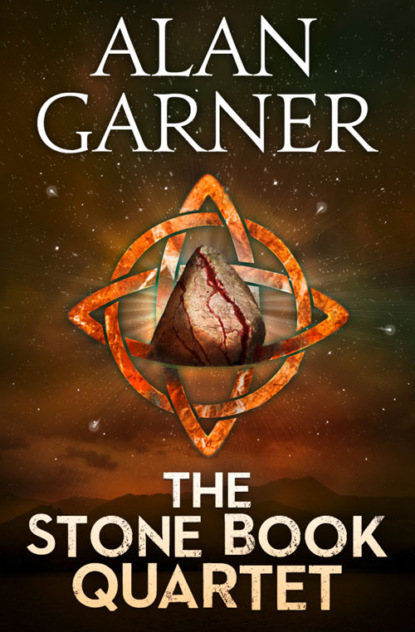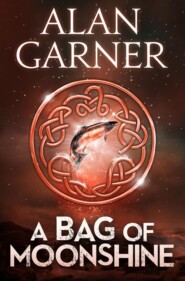По всем вопросам обращайтесь на: info@litportal.ru
(©) 2003-2025.
✖
The Stone Book Quartet
Настройки чтения
Размер шрифта
Высота строк
Поля
They went up the field at the back of the house and onto Glaze Hill. When they reached the top the sun was ready for setting. The weathercock on Saint Philip’s was losing light, and woods stretched out.
‘I can’t see the churches,’ said Mary. ‘When we were up there this afternoon I could.’
‘That’s because they’re all of a height,’ said Father. ‘I told you Glaze Hill was higher.’
Glaze Hill was the middle of three spurs of land. The Wood Hill came in from the right, and Daniel Hill from the left, and they met at the Engine Vein. The Engine Vein was a deep crevice in the rocks, and along it went the tramroad for the miners who dug galena, cobalt and malachite. The thump of the engine that pumped water out of the Vein could often be heard through the ground on different parts of the hill, when the workings ran close to the surface.
Now it was dusk, and the engine quiet. The tramroad led down to the head of the first stope, and there was a ladder for men to climb into the cave.
Mary was not allowed at the Vein. It killed at least once every year, and even to go close was dangerous, because the dead sand around the edge was hard and filled with little stones that slipped over the crag.
Father walked on the sleepers of the tramroad down into the Engine Vein.
‘It’s nearly night,’ said Mary. ‘It’ll be dark.’
‘We’ve candles,’ said Father.
There was a cool smell, and draughts of sweet air. The roof of the Vein began, and they were under the ground. Water dripped from the roof onto the sandstone, splashing echoes. The drops fell into holes. They had fallen for so many years in the same place that they had worn the rock. Mary could get her fingers into some of the holes, but they were deeper than her hands.
Above and behind her, Mary saw the last of the day. In front and beneath was the stope, where it was always night.
Father took the whole bundle of candles and set them on the rocks and lit them. They showed how dark it was in the stope.
‘Wait while you get used to it,’ said Father. ‘You soon see better. Now what about that roof?’
Mary looked up into the shadows. ‘It’s not dimension stone,’ she said. ‘There’s a grain to it, and it’s all ridge and furrow.’
‘But if you’d been with me that day,’ said Father, ‘when I was prenticed and walked to the sea, you’d have stood on sand just the same as that. The waves do it, going back and to. And it makes the ridges proper hard, and if you left it I reckon it could set into stone. But the tide goes back and to, back and to, and wets it. And your boots sink in and leave a mark.’
‘If that’s the sea, why’s it under the ground?’ said Mary.
‘And whose are those boots?’ said Father.
There were footprints in the roof, flattening the ripples, as though a big bird had walked there.
‘Was that Noah’s flood, too?’ said Mary.
‘I can’t tell you,’ said Father. ‘If it was, that bantam never got into the ark.’
‘It must’ve been as big as Saint Philip’s cockerel,’ said Mary.
‘Bigger,’ said Father. ‘And upside down.’
‘It doesn’t make sense,’ said Mary.
‘It would if we could plunder it deep enough,’ said Father. ‘I reckon that if you’re going to put the sea in a hill and turn the world over and let it dry, then you’ve got to be doing before nine o’clock in the morning. But preachers aren’t partial to coming down here, so it doesn’t matter. Does it?’
He blew out all the candles except two. He gave one to Mary and stepped onto the ladder. Mary went with him, and climbed between his arms down into the stope.
‘It’d take some plucking,’ she said.
‘If it had feathers.’
The stope was the shape of a straw beehive and tunnels led everywhere. Mary couldn’t see the top of the ladder.
‘If you’d fallen, you’d have been killed dead as at Saint Philip’s,’ said Father.
‘It’s different,’ said Mary. ‘There’s no height.’
‘There’s depth, and that’s no different than height,’ said Father.
‘It doesn’t call you,’ said Mary.
Father held Mary’s hand sailor’s grip and went into a tunnel under a ledge at the bottom of the stope. They didn’t go far. There was a shaft in the rock, not a straight one, but when Father bridged it with his feet, the pebbles rattled down for a long time. It was easy climbing, even with a candle to be held, because the rock kept changing, and each change made a shelf. There was puddingstone, marl and foxbench, and only the marl was slippery.
‘That’s it,’ said Father. They were at a kink in the shaft.
‘What about further down?’ said Mary.
‘It’s only rubbish gangue from here to the bottom; neither use nor ornament. Although there was a man, him as sank this shaft, and he could read books and put a letter together. But he lost his money, for all his reading. Now if he’d read rocks instead of books, it might have been a different story, you see.’
Father held his candle out to the side. There was a crack, not a tunnel. The rock itself had made it.
‘Hold fast to your light,’ said Father. ‘And keep the matches out of the wet.’
Father had to crawl. Mary could stand, but even she had to squeeze, because of the narrowness.
The crack went up and down, wavering through the hill. Then Father stopped. He couldn’t turn his head to speak, but he could crouch on his heel. ‘Climb over,’ he said.
Mary pulled herself across his back. A side of wall had split off and jammed in the passage, almost closing it.
‘Can you get through there?’ said Father.
‘Easy,’ said Mary.
‘Get through and then listen,’ said Father.
Mary wriggled past the flake and stood up. The passage went on beyond her light. Father’s candle made a dark hole of where she had come, and she could see his boots and one hand. He pushed the bobbin of bad ends through to her, and six candles. He kept hold of the loose end of silk.
‘What’s up?’ said Mary. ‘What are we doing?’
‘You still want a book for Sundays?’ said Father. ‘Even if you can’t read?’
‘Yes,’ said Mary.
‘Then this is what we’re doing,’ said Father. ‘So you listen. You’re to keep the lucifers dry, and use only one candle. It should be plenty. Let the silk out, but don’t pull on it, else it’ll snap. It’s to fetch you back if you’ve no light, and that’s all it’s for. Now then. You’ll find you go down a bit of steep, and then the rock divides. Follow the malachite. Always follow the malachite. Do you understand me?’
‘Yes, Father.’











